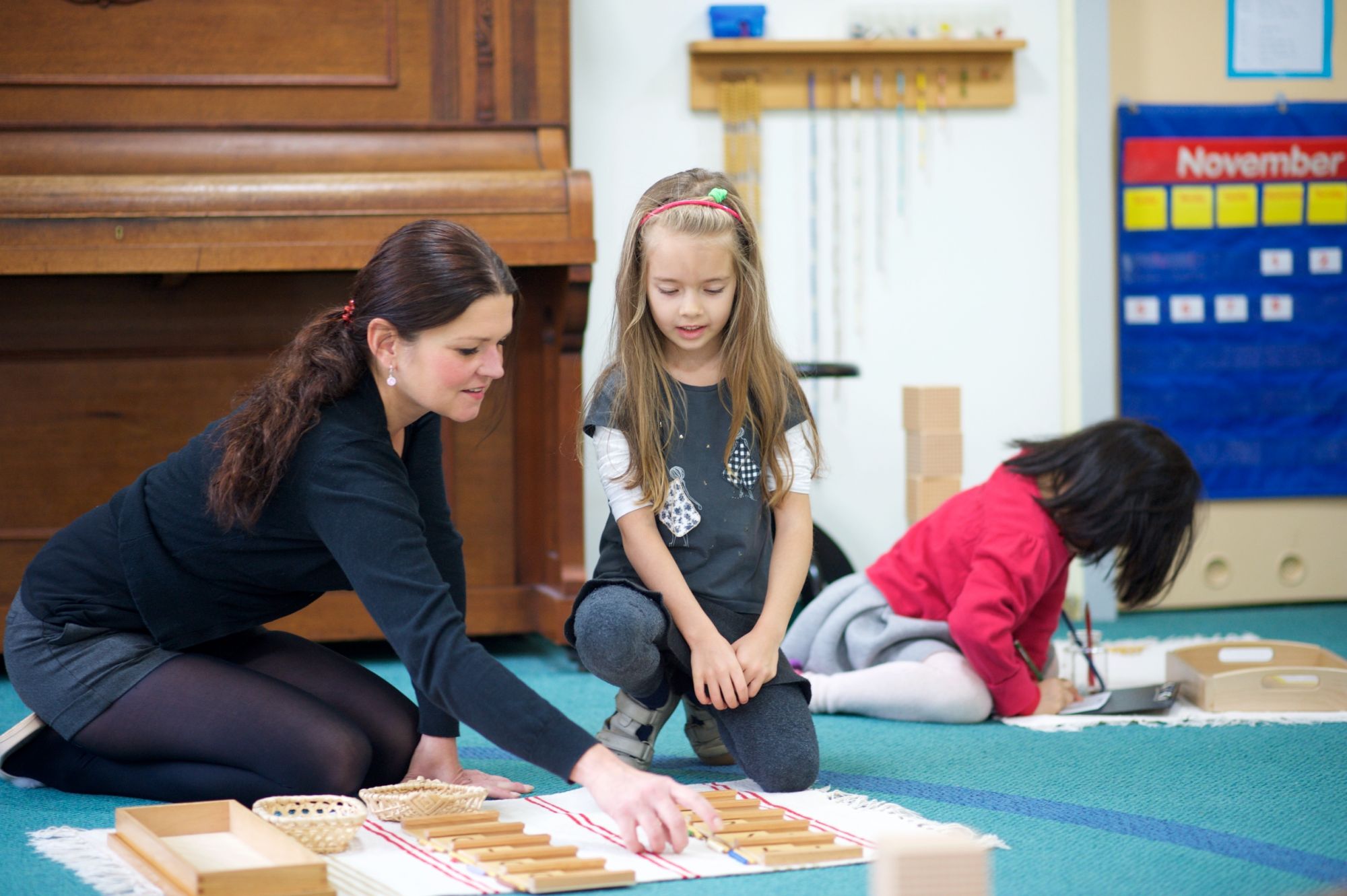What Makes a Good School

You understand the essentials, you are committed to a Montessori Education, you know your accrediting organizations , and you are looking at schools. How can you tell you found the right one?
Choosing the right school is a daunting decision. Ideally, you are committing to one for years of not only your life, but more importantly, your child’s: you are choosing a place where they will spend a major part of their most formative years. Here are some tips on selecting the school that is right for you and your family.
Get Close and Personal
In this day and age, your first contact with a school will probably be online. By all means, read through the website – however, do not stop there. Online presentation is a very small part of what a school is: many a wonderful school has the most perfunctory, out-of-date webpage, and many a poor school has a slick and professional one. Email, call, and set a date to visit as soon as possible.
(Please, do not just come unannounced. The chance that a school will be able to accommodate you and tour you in any meaningful manner without an appointment are quite slim.)
And do not limit your personal contact to just meeting the administrator, either. A good school should offer – some insist – that you tour the premises and even observe in the classrooms while school is in session. This is an incredibly worthwhile investment of your time. Check with the person touring you – can you walk around the space? Pick up materials, take pictures (the answer will probably depend on whether students are present during your visit)? If so, do – take full advantage of this opportunity to learn about the school firsthand.
Be Honest
You are not looking for “the best school”, you are looking for a school that is best for your family. Even among wonderful Montessori schools, there is a variety of approaches and differences – “there is always more than one way to do anything”. Be honest with the school about your expectations, needs, educational philosophy. If certain logistical details are important to you, ask in advance! For example, can they accommodate your dietary needs? Religious holidays and attendance requirements? Early drop-off or late pick-up in the afternoons? What are their policies and curriculum on Sports and Creative Arts? Do they offer an after-school program? Bilingual education? Don’t be offended if the school suggests you look elsewhere – rather, ask them for recommendations for places they believe would suit your needs better!

Explore the fundamentals of Montessori parenting with this free video by Sylvia Arotin, offering insights and strategies to empower and educate your child.
What Any School Should Provide
In your conversation with the school administration or guide, there are things that must come up if the school is truly providing a Montessori education.
- Teacher education and training. What are their credentials, and how do they ensure they are truly providing a Montessori education? Teachers should be going through continuing professional development and education throughout their careers, as well. Does the school require or support this? Ideally, the top level of school administration would have a Montessori credential, as well.
- Child-centered, developmental approach rather than “set” academics. The school must focus on a child’s individual needs and avoid grading and comparisons between students. At the same time, a school should be able provide a robust overview of their curriculum as well as detailed records of a student’s progress. Note that some amount of standardized assessment might be required by the local authorities and the school should provide you transparent information about what exactly the requirements are and how the school ensures they do not disturb the Montessori model.
- Clearly set expectations and child’s freedom within limits. The students must be afforded opportunities to take ownership and make choices regarding their education at an age-appropriate level, from selection of activities to self-led work plans or special-interest projects.
- Student independence and proactive efforts towards supporting it. Physical, mental and emotional independence must be a key element of the school’s educational philosophy and approach.
- Uninterrupted work cycle and independent, concentrated work of the student. At every level, the core of the school day must be a period of focused work time.
- A consequence-based discipline, and absence of punishment. Especially, absolute absence of punishment for mistakes.
- A holistic curriculum including relationship with nature, as well as character based education. Commonly employed concepts include global citizenship, ecological consciousness, and values education.
What to Look for
Now, for the things you should see in person. Feel free to print out the following points as a “cheat sheet” to focus on during your visit! All of these are important or necessary things for any school (not only Montessori) to exhibit – if there is an issue, make sure to bring the point up with the person guiding you around the school. They might have a good answer – there might be a temporary problem, or a solution you did not see – but they should understand your concern and meaningfully address it.
Facility
The classrooms should be the best-looking part of the school, with most attention paid to detail and equipment. This is, after all, where the heart and soul of a school is.
- Is the temperature, air quality and light appropriate throughout the school?
- Is the entire facility accessible and safe for children? Look at wiring, stairs, flooring, egresses.
- Is the entire facility neat and well-maintained? Depending on a school’s budget, things may not be bright and new, but they should still be clean, well organized and cared for.
- Are the classrooms neat and attractive, with a richness of materials set in clear order?
- Are the classrooms child-centered? There might be some areas that are off limits (storage cupboards and the such) but the majority of the space should be fully at the children’s disposal.
- Are all of the curriculum areas represented? Also, look out for things that should not be found in a Montessori space – TVs, inappropriate toys or adult-oriented objects.
- Is there an outdoor space? Does it provide sufficient opportunities for free play, relaxation, and motor activities?
Staff
The adult guides are the key element of the environment when it comes to the child’s experience. They are professionals in a demanding social-oriented career – they should look and act like it.
- Are the staff members well-spoken, pleasant and welcoming? Are you comfortable with the school’s standards of personal grooming and professional appearance?
- Do the staff members appear overall relaxed and calm? Do you feel comfortable in their company?
- How do the adults interact with the children? Can you observe them getting down to the child’s level, making eye contact, speaking gently, communicating respect and affection to the children?
- The teachers should not continuously appear the center of attention. During lessons, they should direct the child’s attention the the activity, and allow children space to work independently. Can you observe them stepping away and offering space for independent exploration?
- How do the staff members interact with one another? Do they treat each other with dignity and respect?
Students
Of course, the proof of the pudding is in the eating, and the proof of good teaching, Dr. Montessori said, is in the child’s happiness. Now, of course even in the best school you might come across students who are, in the moment, unhappy, crying, sullen or uncooperative – but looking at the community as a whole should give you clear insights.
- Do the children appear relaxed, active, and confident?
- Are they moving freely throughout the environment and choosing their own activities?
- Are they interacting freely? Can you see age-appropriate levels of friendly exchanges, conversation or cooperation? (Note that in Montessori preschool environments, the majority of children will be working by themselves. This is appropriate and not a sign of a social problem.)
- Are the children respectful and careful with one another and the environment? Are they handling materials with care?
- How are other students and staff responding to a child who is upset or misbehaving? Can you observe student-led conflict resolution or proactive offers of help or comfort to another student?
Happy Touring!
Montessori Beginnings
YOUR ULTIMATE
MONTESSORI PARENTING COURSE
FOR ZERO TO THREE
Gain clarity and confidence in your parenting to raise a resilient, independent and joyful child.


